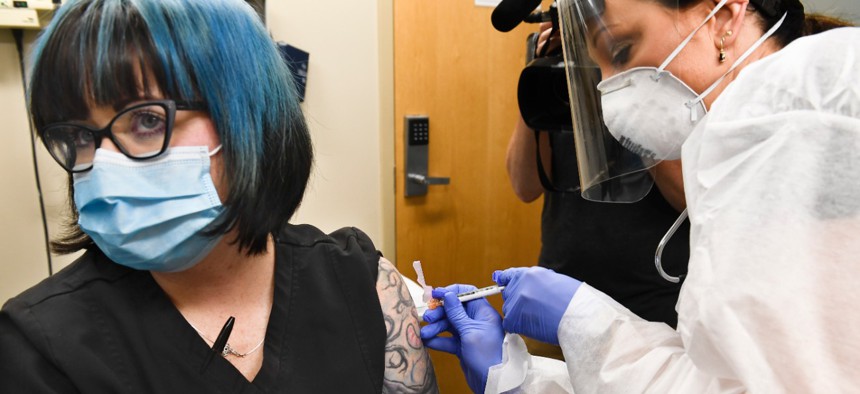
Nurse Kathe Olmstead, right, gives Melissa Harting, of Harpersville, N.Y., an injection as the world's biggest study of a possible COVID-19 vaccine, developed by NIH and Moderna Inc., gets underway on July 27. Hans Pennink
Lawmakers From Both Parties Seek Greater Vaccine Oversight
Under “Operation Warp Speed,” the Trump administration hopes to develop and distribute a vaccine for COVID-19 by early 2021.
As the first U.S.-developed coronavirus vaccine reaches a critical stage in the trial process, a bipartisan group of lawmakers asked a watchdog to keep closer tabs on the Trump administration's multi-billion-dollar plan to develop and distribute a vaccine by early next year.
On Friday, Reps. James Clyburn, D-S.C., chairman of the House Select Subcommittee on the Coronavirus Crisis, Bill Foster, D-Ill., and Mark Green, R-Tenn., asked the Government Accountability Office for periodic reviews of “Operation Warp Speed,” the public-private effort launched by the administration in May to develop, manufacture and distribute 300 million doses of vaccine for COVID-19 by January 2021. The operation is led by Moncef Slaoui, an immunologist and former pharmaceutical executive, and Gen. Gus Perna, commanding general of the Army Materiel Command.
The unprecedented effort has generated a number of concerns, including questions over Slaoui's history and ties to industry, political pressure to accelerate the vaccine development process, who will receive the vaccine first, and Operation Warp Speed’s selection of a company that has never brought a product to market for a $1.6 billion contract.
“We seek to work alongside [the Health and Human Services Department] to ensure these tax dollars are used effectively and efficiently in pursuit of vaccines and treatments for the coronavirus,” the lawmakers wrote. “Real-time monitoring by GAO has the potential to augment the scientific and project management expertise of the staff at ‘Operation Warp Speed,’ serve as a nonpartisan interface to congressional oversight, enhance the organization and management of the projects, and reduce the risk of delays and other setbacks in this endeavor.”
They specifically asked GAO to examine the organizational structure of the initiative; criteria used to allot funding and resources; coordination with other federal vaccine development initiatives; progress towards the goal of delivering 300 million doses of a vaccine to the public by January 2021; adherence to whistleblower protections and conflict of interest regulations; and transparency with regard to how the vaccine will be distributed.
“We request that GAO provide the select subcommittee and the relevant departments with monthly bipartisan staff briefings beginning in August 2020 and written reports every three months beginning in September 2020, until Operation Warp Speed is disbanded,” Clyburn, Foster and Green wrote. They noted that Comptroller General Gene Dodaro said during a hearing on June 26, that GAO has the ability to do “real time” oversight, which it has done in the past.
With the presidential election looming in November, some scientists have worried that the administration will pressure health officials to speed up the already ambitious vaccine process, The Washington Post reported last month. However, Food and Drug Administration Commissioner Dr. Stephen Hahn said in a statement on June 30 “we will not cut corners in our decisions,” despite the pressing need for a safe vaccine. FDA will “maintain our regulatory independence and ensure our decisions related to all medical products, including COVID-19 vaccines, are based on science and the available data,” he said.
So far there are five vaccines globally in phase three of clinical trials; the first one in the United States (and under “Operation Warp Speed”) began on Monday and is the largest coronavirus trial in the world. Phase three is the stage when experimental drugs are tested on large groups of people, typically 1,000-3,000, to test their effectiveness and safety prior to licensing. The vaccine entering this stage on Monday was developed by the biotechnology company Moderna and the National Institute of Allergy and Infectious Diseases, a division of NIH. The agency expects to enroll about 30,000 adults in the study across 89 research sites across the country.
GAO said the lawmakers’ request will go through its normal evaluation process before the agency decides whether or not to take up the review.







